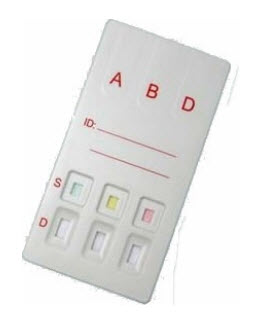Table of Contents
Pregnancy is a miraculous journey, and ensuring the well-being of both the mother and the baby is of paramount importance. A crucial aspect of prenatal care involves understanding the ABO and RhD blood types, as they play a significant role in prenatal testing and the overall management of pregnancy.
Understanding ABO Blood Typing in Pregnancy
ABO blood typing is a fundamental aspect of prenatal testing. The blood types of both the mother and the father are considered to predict the potential blood type of the baby. This knowledge is particularly important when the parents have different blood types, as it determines the risk of ABO incompatibility between the mother and the baby.
ABO incompatibility occurs when the mother is blood type O, and the baby inherits a blood type A, B, or AB. In such cases, the mother’s immune system may produce antibodies against the baby’s blood cells, leading to complications such as hemolytic disease of the newborn (HDN). Regular monitoring and appropriate medical interventions are essential to manage and mitigate the risks associated with ABO incompatibility during pregnancy.
RhD Blood Typing and Rh Incompatibility
The RhD factor is another critical consideration in prenatal testing. Rh incompatibility arises when the mother is RhD negative, and the baby is RhD positive. In such situations, the mother’s immune system may produce antibodies against the RhD-positive blood cells of the baby, potentially causing HDN.
To prevent Rh incompatibility complications, Rh-negative pregnant women often receive Rh immunoglobulin (RhIg) injections during pregnancy. This intervention helps to prevent the development of Rh antibodies and reduces the risk of HDN. RhD blood typing is, therefore, a crucial component of prenatal care, allowing healthcare professionals to tailor interventions based on the specific needs of each pregnancy.
Screening for ABO and RhD Blood Types
During the early stages of pregnancy, healthcare providers routinely conduct blood tests to determine the ABO and RhD blood types of the expectant parents. This information forms the basis for predicting potential blood type combinations in the baby.
In cases where ABO or RhD incompatibility is identified, healthcare professionals can closely monitor the pregnancy and take proactive measures to ensure the health of both the mother and the baby. Regular screenings and assessments enable timely interventions, reducing the risk of complications associated with blood type differences.
Role of ABO & RhD Rapid Tests in Prenatal Care
Traditional laboratory methods for blood typing are reliable but may take time for results. In situations requiring immediate decisions, such as emergencies during pregnancy, ABO RhD test become invaluable. These tests provide quick and accurate results, allowing healthcare providers to make timely decisions regarding interventions and care.
The speed of ABO & RhD rapid tests is particularly crucial in situations where urgent actions are needed to safeguard the health of the mother and the baby. Rapid tests offer a convenient and efficient way to determine blood types, contributing to the overall effectiveness of prenatal care.

Genetic Considerations in Blood Typing
While ABO and RhD blood types are primarily determined by the parents’ blood types, genetic variations can introduce complexities. Understanding the genetic factors influencing blood typing is essential for accurate predictions and tailored prenatal care.
Genetic counseling may be recommended for couples with specific concerns about blood type compatibility or those with a history of blood type-related complications in previous pregnancies. Through genetic counseling, prospective parents can gain insights into the potential risks and receive guidance on appropriate measures to ensure a healthy pregnancy.
Conclusion: Navigating Pregnancy with ABO and RhD Blood Typing Knowledge
In conclusion, ABO and RhD blood typing are integral components of prenatal testing and pregnancy management. Understanding the potential risks associated with blood type differences allows healthcare providers to implement proactive measures, ensuring the well-being of both the mother and the baby.
Whether through traditional laboratory methods or the expediency of ABO & RhD rapid tests, obtaining timely and accurate blood typing results is crucial. Genetic considerations further enhance our ability to provide personalized care, addressing the unique needs of each pregnancy.
As we continue to advance in medical technology and genetic understanding, the role of ABO and RhD blood typing in prenatal care remains foundational. This knowledge empowers healthcare professionals and expectant parents to navigate the intricate journey of pregnancy with confidence, promoting the health and happiness of growing families.
Frequently Asked Questions (FAQs) About ABO RhD Blood Grouping Test
Q1: Why is ABO blood typing important during pregnancy?
ABO blood typing helps predict potential incompatibility between the mother and baby’s blood types, reducing the risk of complications like hemolytic disease of the newborn (HDN).
Q2: What is Rh incompatibility, and how is it managed during pregnancy?
Rh incompatibility occurs when the mother is RhD negative, and the baby is RhD positive. Management involves Rh immunoglobulin (RhIg) injections to prevent the development of antibodies.
Q3: How are ABO and RhD blood types screened during pregnancy?
Routine blood tests in early pregnancy determine the ABO and RhD blood types of the expectant parents, forming the basis for predicting potential blood type combinations in the baby.
Q4: What role do ABO & RhD rapid tests play in prenatal care?
Rapid tests provide quick and accurate blood typing results, enabling timely decisions in emergencies and contributing to the overall effectiveness of prenatal care.
Q5: Why is genetic counseling recommended in certain cases of blood type concerns during pregnancy?
Genetic counseling offers insights into potential risks associated with blood type differences, guiding prospective parents on appropriate measures for a healthy pregnancy.

